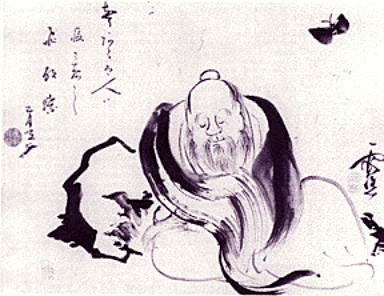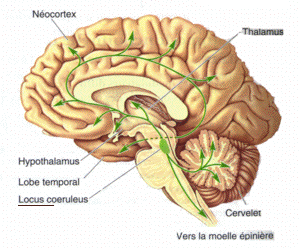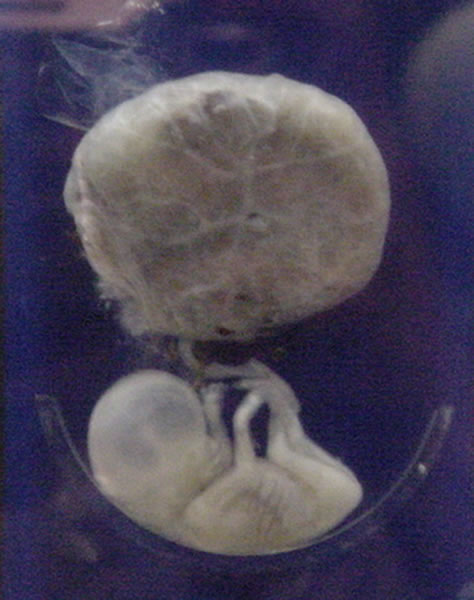|
Waking State
Wakefulness is a daily recurring brain state and state of consciousness in which an individual is conscious and engages in coherent cognitive and behavioral responses to the external world. Being awake is the opposite of being asleep, in which most external inputs to the brain are excluded from neural processing. Effects upon the brain The longer the brain has been awake, the greater the synchronous firing rates of cerebral cortex neurons. After sustained periods of sleep, both the speed and synchronicity of the neurons firing are shown to decrease. Another effect of wakefulness is the reduction of glycogen held in the astrocytes, which supply energy to the neurons. Studies have shown that one of sleep's underlying functions is to replenish this glycogen energy source. Maintenance by the brain Wakefulness is produced by a complex interaction between multiple neurotransmitter systems arising in the brainstem and ascending through the midbrain, hypothalamus, thalamus and basal f ... [...More Info...] [...Related Items...] OR: [Wikipedia] [Google] [Baidu] |
Human Brain
The human brain is the central organ of the human nervous system, and with the spinal cord makes up the central nervous system. The brain consists of the cerebrum, the brainstem and the cerebellum. It controls most of the activities of the body, processing, integrating, and coordinating the information it receives from the sense organs, and making decisions as to the instructions sent to the rest of the body. The brain is contained in, and protected by, the skull bones of the head. The cerebrum, the largest part of the human brain, consists of two cerebral hemispheres. Each hemisphere has an inner core composed of white matter, and an outer surface – the cerebral cortex – composed of grey matter. The cortex has an outer layer, the neocortex, and an inner allocortex. The neocortex is made up of six neuronal layers, while the allocortex has three or four. Each hemisphere is conventionally divided into four lobes – the frontal, temporal, parietal, and occipital lo ... [...More Info...] [...Related Items...] OR: [Wikipedia] [Google] [Baidu] |
Orexins
Orexin (), also known as hypocretin, is a neuropeptide that regulates arousal, wakefulness, and appetite. The most common form of narcolepsy, type 1, in which the individual experiences brief losses of muscle tone ("drop attacks" or cataplexy), is caused by a lack of orexin in the brain due to destruction of the cells that produce it.Stanford Center for NarcolepsFAQ(retrieved 27-Mar-2012) It exists in the forms of Orexin-A and Orexin-B. There are 50,000–80,000 orexin-producing neurons in the human brain, located predominantly in the perifornical area and lateral hypothalamus. They project widely throughout the central nervous system, regulating wakefulness, feeding, and other behaviours. There are two types of orexin peptide and two types of orexin receptor. Orexin was discovered in 1998 almost simultaneously by two independent groups of researchers working on the rat brain. One group named it orexin, from ''orexis,'' meaning "appetite" in Greek; the other group named it ... [...More Info...] [...Related Items...] OR: [Wikipedia] [Google] [Baidu] |
Sleepwalking
Sleepwalking, also known as somnambulism or noctambulism, is a phenomenon of combined sleep and wakefulness. It is classified as a sleep disorder belonging to the parasomnia family. It occurs during slow wave stage of sleep, in a state of low consciousness, with performance of activities that are usually performed during a state of full consciousness. These activities can be as benign as talking, sitting up in bed, walking to a bathroom, consuming food, and cleaning, or as hazardous as cooking, driving a motor vehicle, violent gestures and grabbing at hallucinated objects.Swanson, Jenifer, ed. "Sleepwalking". ''Sleep Disorders Sourcebook''. MI: Omnigraphics, 1999. 249–254, 351–352. Although sleepwalking cases generally consist of simple, repeated behaviors, there are occasionally reports of people performing complex behaviors while asleep, although their legitimacy is often disputed. Sleepwalkers often have little or no memory of the incident, as their consciousness has ... [...More Info...] [...Related Items...] OR: [Wikipedia] [Google] [Baidu] |
Lucid Dream
A lucid dream is a type of dream in which the dreamer becomes aware that they are dreaming while dreaming. During a lucid dream, the dreamer may gain some amount of control over the dream characters, narrative, or environment; however, this is not actually necessary for a dream to be described as lucid. Lucid dreaming has been studied and reported for many years. Prominent figures from ancient to modern times have been fascinated by lucid dreams and have sought ways to better understand their causes and purpose. Many different theories have emerged as a result of scientific research on the subject and have even been shown in pop culture. Further developments in psychological research have pointed to ways in which this form of dreaming may be utilized as a form of sleep therapy. Etymology The term ''lucid dream'' was coined by Dutch author and psychiatrist Frederik van Eeden in his 1913 article ''A Study of Dreams'', though descriptions of dreamers being aware that they are drea ... [...More Info...] [...Related Items...] OR: [Wikipedia] [Google] [Baidu] |
High-conductance State
The term high-conductance state describes a particular state of neurons in specific states of the brain, such as for example during wakefulness, attentive states, or even during some anesthetized states. In individual neurons, the high-conductance state is formally defined by the fact that the total synaptic conductance received by the neuron is larger than its natural resting (or leak) conductance, so in a sense the neuron is "driven" by its inputs rather than being dominated by its intrinsic activity. High-conductance states have been well characterized experimentally, but they also have motivated numerous theoretical studies, in particular in relation to the considerable amount of "noise" present in such states. It is believed that this "synaptic noise" has determinant properties on neuronal processing, and even may confer several computational advantages to neurons (see details in the articlHigh-Conductance Statein Scholarpedia). The term high-conductance state is also used t ... [...More Info...] [...Related Items...] OR: [Wikipedia] [Google] [Baidu] |
Eugeroic
Eugeroics (originally "eugrégorique" or "eugregoric"), also known as wakefulness-promoting agents and wakefulness-promoting drugs, are a class of drugs that promote wakefulness and alertness. They are medically indicated for the treatment of certain sleep disorders including excessive daytime sleepiness (EDS) in narcolepsy or obstructive sleep apnea (OSA). Eugeroics are also often prescribed off-label for the treatment of EDS in idiopathic hypersomnia, a rare and often debilitating sleep disorder which currently has no official treatments approved by the Food and Drug Administration (FDA). In contrast to classical psychostimulants, such as methylphenidate and amphetamine, which are also used in the treatment of these disorders, eugeroics typically do not produce euphoria, and, consequently, have a lower addictive potential. Modafinil and armodafinil are each thought to act as selective, weak, atypical dopamine reuptake inhibitors (DRI), whereas adrafinil acts as a prodrug for ... [...More Info...] [...Related Items...] OR: [Wikipedia] [Google] [Baidu] |
Dream Argument
The dream argument is the postulation that the act of dreaming provides preliminary evidence that the senses we trust to distinguish reality from illusion should not be fully trusted, and therefore, any state that is dependent on our senses should at the very least be carefully examined and rigorously tested to determine whether it is in fact reality. Synopsis While dreaming, one does not normally realize one is dreaming. On more rare occasions, the dream may be contained inside another dream with the very act of realizing that one is dreaming, itself, being only a dream that one is not aware of having. This has led philosophers to wonder whether it is possible for one ever to be certain, at any given point in time, that one is not in fact dreaming, or whether indeed it could be possible for one to remain in a perpetual dream state and never experience the reality of wakefulness at all. In Western philosophy this philosophical puzzle was referred to by Plato ( ''Theaetetus'' ... [...More Info...] [...Related Items...] OR: [Wikipedia] [Google] [Baidu] |
Locus Coeruleus
The locus coeruleus () (LC), also spelled locus caeruleus or locus ceruleus, is a nucleus in the pons of the brainstem involved with physiological responses to stress and panic. It is a part of the reticular activating system. The locus coeruleus, which in Latin means "blue spot", is the principal site for brain synthesis of norepinephrine (noradrenaline). The locus coeruleus and the areas of the body affected by the norepinephrine it produces are described collectively as the locus coeruleus-noradrenergic system or LC-NA system. Norepinephrine may also be released directly into the blood from the adrenal medulla. Anatomy The locus coeruleus (LC) is located in the posterior area of the rostral pons in the lateral floor of the fourth ventricle. It is composed of mostly medium-size neurons. Melanin granules inside the neurons of the LC contribute to its blue colour. Thus, it is also known as the nucleus pigmentosus pontis, meaning "heavily pigmented nucleus of the pons." The n ... [...More Info...] [...Related Items...] OR: [Wikipedia] [Google] [Baidu] |
Childbirth
Childbirth, also known as labour and delivery, is the ending of pregnancy where one or more babies exits the internal environment of the mother via vaginal delivery or caesarean section. In 2019, there were about 140.11 million births globally. In the developed countries, most deliveries occur in hospitals, while in the developing countries most are home births. The most common childbirth method worldwide is vaginal delivery. It involves four stages of labour: the shortening and opening of the cervix during the first stage, descent and birth of the baby during the second, the delivery of the placenta during the third, and the recovery of the mother and infant during the fourth stage, which is referred to as the postpartum. The first stage is characterized by abdominal cramping or back pain that typically lasts half a minute and occurs every 10 to 30 minutes. Contractions gradually becomes stronger and closer together. Since the pain of childbirth correlates with contractions ... [...More Info...] [...Related Items...] OR: [Wikipedia] [Google] [Baidu] |
Newborn
An infant or baby is the very young offspring of human beings. ''Infant'' (from the Latin word ''infans'', meaning 'unable to speak' or 'speechless') is a formal or specialised synonym for the common term ''baby''. The terms may also be used to refer to juveniles of other organisms. A newborn is, in colloquial use, an infant who is only hours, days, or up to one month old. In medical contexts, a newborn or neonate (from Latin, ''neonatus'', newborn) is an infant in the first 28 days after birth; the term applies to premature, full term, and postmature infants. Before birth, the offspring is called a fetus. The term ''infant'' is typically applied to very young children under one year of age; however, definitions may vary and may include children up to two years of age. When a human child learns to walk, they are called a toddler instead. Other uses In British English, an ''infant school'' is for children aged between four and seven. As a legal term, ''infancy'' is more lik ... [...More Info...] [...Related Items...] OR: [Wikipedia] [Google] [Baidu] |
Fetus
A fetus or foetus (; plural fetuses, feti, foetuses, or foeti) is the unborn offspring that develops from an animal embryo. Following embryonic development the fetal stage of development takes place. In human prenatal development, fetal development begins from the ninth week after fertilization (or eleventh week gestational age) and continues until birth. Prenatal development is a continuum, with no clear defining feature distinguishing an embryo from a fetus. However, a fetus is characterized by the presence of all the major body organs, though they will not yet be fully developed and functional and some not yet situated in their final anatomical location. Etymology The word ''fetus'' (plural ''fetuses'' or '' feti'') is related to the Latin '' fētus'' ("offspring", "bringing forth", "hatching of young") and the Greek "φυτώ" to plant. The word "fetus" was used by Ovid in Metamorphoses, book 1, line 104. The predominant British, Irish, and Commonwealth spelling is '' ... [...More Info...] [...Related Items...] OR: [Wikipedia] [Google] [Baidu] |
Narcolepsy
Narcolepsy is a long-term neurological disorder that involves a decreased ability to regulate sleep–wake cycles. Symptoms often include periods of excessive daytime sleepiness and brief involuntary sleep episodes. About 70% of those affected also experience episodes of sudden loss of muscle strength, known as cataplexy. Narcolepsy paired with cataplexy is evidenced to be an autoimmune disorder. These experiences of cataplexy can be brought on by strong emotions. Less commonly, there may be vivid hallucinations or an inability to move (sleep paralysis) while falling asleep or waking up. People with narcolepsy tend to sleep about the same number of hours per day as people without, but the quality of sleep tends to be lessened. Narcolepsy is a clinical syndrome of hypothalamic disorder, however, the exact cause of narcolepsy is unknown, with potentially several causes. In up to 10% of cases, there is a family history of the disorder. Often, those affected have low levels of ... [...More Info...] [...Related Items...] OR: [Wikipedia] [Google] [Baidu] |







